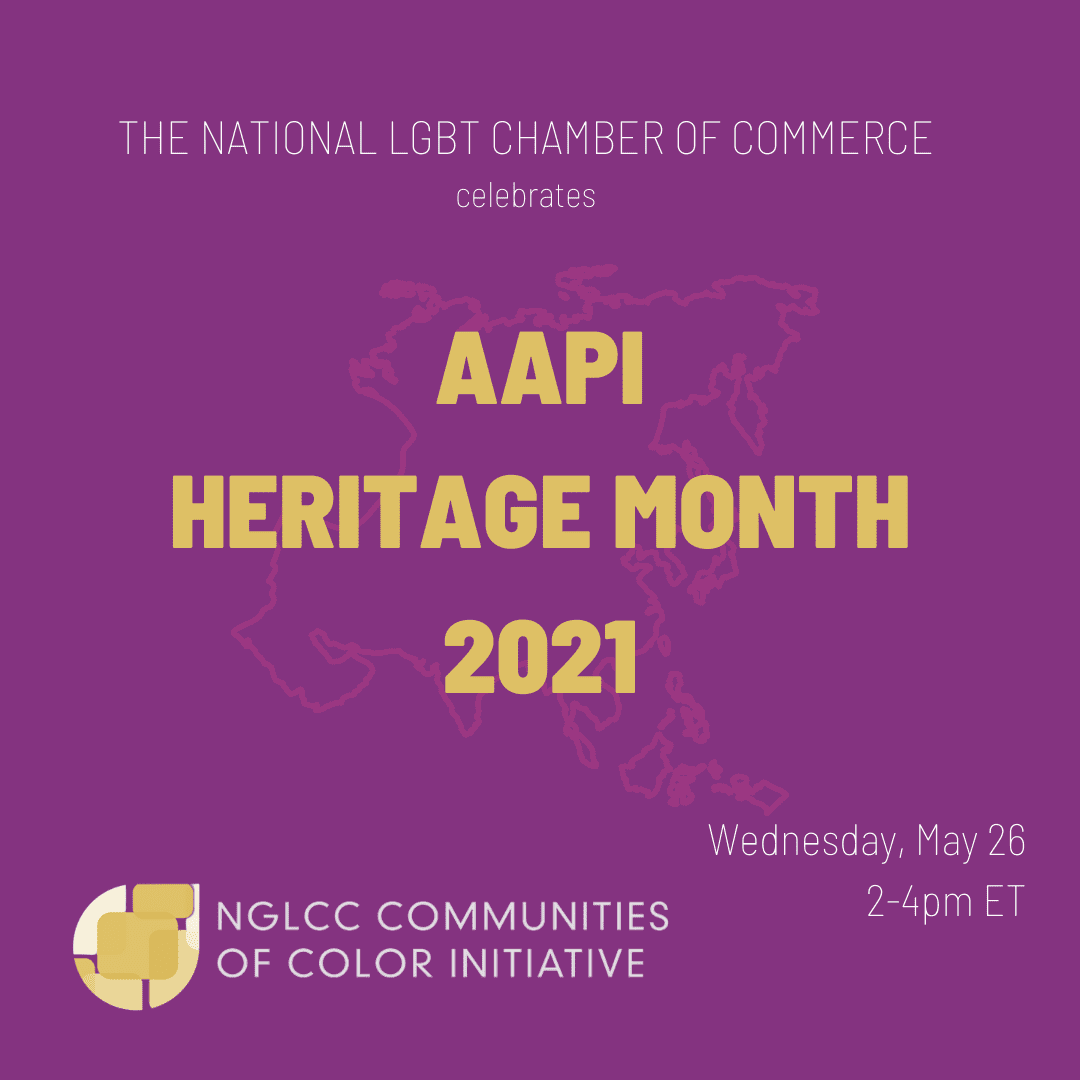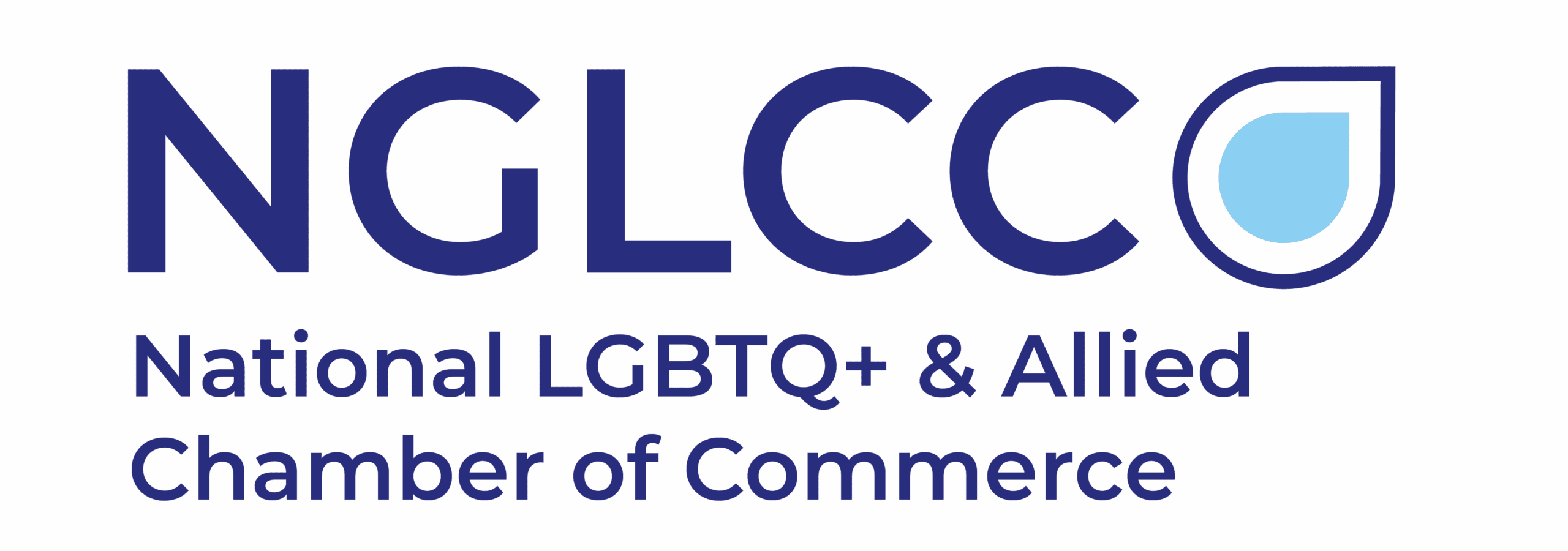
On Wednesday, May 26th, the NGLCC Communities of Color Initiative (CoCi) hosted a panel of business leaders and entrepreneurs to celebrate AAPI Heritage Month and discuss “Living Out Loud: Breaking the Myth of the Model Minority.” Panelists of this event included Susu Wong (she/her), founder of Tomo360; Steven Wong (he/him), founder and co-CEO of Ready State; Amita Mehta (she/her), founder of Amita Mehta Possible; and Joy Wong (she/her), Vice President of Supplier Diversity at New York Life. These speakers were joined by Sean Franklin (he/him), NGLCC Manager of Stakeholder Engagement and Co-lead of CoCi, and moderator Trung Tieu (he/him), Manager of Supplier Diversity at PepsiCo.
“The CoCi community is a place where minority LGBTBEs can have their voices heard and brings business leaders from a range of industries and backgrounds to work together, share best practices, and foster success,” said Franklin.
NGLCC Co-founder and President Justin Nelson (he/him) welcomed and thanked everyone for attending and participating in the celebration. Nelson discussed the rise in violence towards Asian Americans and the importance of standing together in solidarity with AAPI friends and allies during this unprecedented time.
“The recent explosion in AAPI violence and discrimination is unacceptable,” Nelson said. “An attack on one of us is an attack on all of us. We stand shoulder to shoulder with our partners, community members, friends, and family in the AAPI community, not only during this month, but always.”
As a kick-off to the afternoon, Trung Tieu asked each panelist to give a brief overview of their experience as business leaders, including how they each came to be in their current positions. Susu Wong, although originally apprehensive, decided to start her online marketing strategy agency, Tomo360, in 2012 and only regrets that she didn’t do it sooner. Steven Wong came from a family of entrepreneurs in Hong Kong, and now works with big tech companies and local lifestyle brands at Ready State. Wong jokingly added that the greatest perk of being an entrepreneur is that you can’t get fired.
After working with others on their brands at consulting firms, panelist Amita Mehta realized she had developed her own “brand” and decided to launch her business two years ago. Joy Wong explained that she has always been passionate about Asian and feminist agendas; in supporting her predecessor in these issues, she reached her current role in supplier diversity, where she has flourished.
In the last year, there has been an overwhelming 149% increase in Asian American hate crimes, largely due to the racist misconceptions and stereotypes surrounding COVID-19. Tieu asked panelists to share their initial reactions to this alarming rise, and any other thoughts or concerns they might have on the topic. Steven Wong noted that he was truly shocked by the degree of violence, as well as confused and pained. Wong stated that one area of improvement is the need for pushback on jumping to conclusions on all sides, regardless of race, gender, or sexuality.
Joy Wong felt insulated as a result of working at home and the false sense of safety that quarantine provides, but highlighted her concerns about the future and returning to the “real” world. Mehta remarked how truly conflicted she has been considering racial disparity has always existed, only now it is profoundly “in our faces.” She pointed out that members of the AAPI community have historically been forced to justify themselves and their existences, and it is no different today.
Allyship is an essential part of supporting any marginalized group. In treading the line between helpful and harmful acts of allyship, Tieu asked panelists to give their recommendations and tips for those looking to be allies. Mehta remarked that simply checking in with AAPI friends and co-workers is the essential first step. Steven Wong discussed the model minority myth and how this ideal perpetuates negative stereotypes and boxes in AAPI individuals. Unlearning this myth is a requirement for true allies. Tieu highlighted the importance of bystander intervention training and understanding, on which Joy Wong agreed that advocate education was significant for allies. In many cases, however, intervening can be dangerous or problematic given the particular circumstances . As an alternative to this, Steven Wong suggested that even taping or recording an altercation could be the difference between life and death, or the possibility of justice, as was the case with individuals like George Floyd.
Visibility in media, or lack thereof, has always plagued the AAPI community, where stereotypes and caricatures of Asian characters run rampant. Three-dimensionality is rarely given to AAPI characters, but there has been a recent improvement on this. Panelists discussed shows like Fresh Off the Boat and Netflix Originals such as Never Have I Ever, both of which have Asian Americans in the cast and crew. Mehta also remarked that Bollywood has long since been a place where Asians defy common stereotypes and show a fun, sexy side rarely seen in American Hollywood.
Considering many participants of the program are both Asian and members of the LGBTQIA+ community, Tieu invited panelists to discuss their intersectionality within the business world. Adversity was most definitely a hardship for Mehta, but she played to her strengths and differences to truly set herself above and apart from others. Susu Wong remarked that coming out as gay is hard enough on an individual level, but incredibly more difficult on a business level. She expressed that overcoming that obstacle was challenging but rewarding in the long run as it opened many doors for her.
Closing topics of the event included advocacy for LGBTBEs and AAPI businesses, opportunities for learning, and support for Asian culture, especially at the local level. Panelists suggested that allies go out and eat at Asian restaurants, purchase directly from Asian businesses, and make a strong effort to view and share positive Asian media representation.
After “Living Out Loud: Myth, Misunderstanding, and Moving Forward,” NGLCC Senior Vice President Sabrina Kent (she/her) hosted NiK Kacy (they/them), founder and CEO of NiK Kacy Footwear, in a fireside chat.
In addition to running their own LGBTBE, NiK Kacy is a part of the NGLCC Transgender & Gender Non-Conforming Task Force mentorship program, and is a creator and Executive Producer of Equality Fashion Week. NiK began their business in response to the lack of accessibility and options for gender neutral footwear. NiK was also fueled by a desire to create an open fashion space for queer people, and is influenced by their intersectional identity of transgender AAPI immigrant.
Sabrina wholeheartedly agreed that fashion, like any area of life, deserves to be free from limitations of gender, sexuality, size, and race. Through their dedicated actions and support, Nik is helping to create these forward-thinking possibilities in the fashion industry and beyond.
In a discussion of the newest changes in CDC mask recommendations, both NiK and Sabrina described their anxieties of the situation, and hope to retain some of the safety measures regardless of vaccination status. Like the previous panelists, NiK also expressed their own concern surrounding the rise in hate and discrimination towards Asians throughout the past year, largely due to racist misconceptions about COVID-19. Nik described their history with attempting to shed their identity of the “model minority” and how it has affected them to this day as a business leader.
NGLCC and the Communities of Color Initiative would again like to thank Tomo360, Ready State, Amita Mehta Possible, New York Life, and PepsiCo for their participation in this valuable celebration of Asian Americans and Pacific Islander.
You can watch the full AAPI Heritage Month celebration here.
